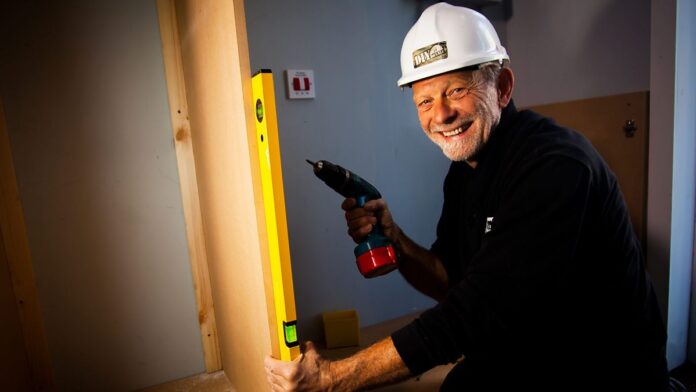- The Compensation Experts reveal top tips on how to stay safe when tackling DIY projects at home.
With the bank holidays well underway and warmer weather on the horizon, it’s time to tackle those house DIY projects that may have built up over the winter months. With an increase in searches for ‘DIY projects’ by +420%1 it seems that many Brits are keen to get stuck into some DIY!
But before jumping into any project and picking up a tool, it’s vital to make sure that safety is a top priority. Taking safety measures not only protects yourself and those around you but your home too.
To help, The Compensation Experts have teamed up with Thomas Goodman, construction expert at MyJobQuote.co.uk to provide top tips on how to stay safe when tackling DIY projects.
1. Wear The Correct Clothing
When working on a DIY project, you should think about what you’re wearing. Wearing watches, bracelets, or long-sleeved or loose clothing can get caught in moving parts or power tools and cause an injury.
Alternatively, keep things short and tidy, and invest in some essential PPE (personal protective equipment) like safety goggles, gloves, steel-toed boots, and dust masks.
2. Prevent Fires
To stay safe during DIY work, you should always have a well-functioning fire extinguisher close by. Oily or solvent-coated rags should be stored in an airtight, metal sealed container, ideally half-filled with water. Dispose of the rags following your community’s regulations.
3. Lighting
Lighting can be a design issue in your home. But it’s all about safety in your garage, basement, or shop. Use bright overhead lighting that you can turn on when you walk into your workspace. It’s also a good idea to have task lighting.
4. Avoid When Tired
Being tired can cut your reaction time in half, so you should postpone any tasks until you’re rested and alert. You should also avoid using power tools if you have had any alcohol or medication, as this can make you drowsy.
5. Be Aware of Your Surroundings
If you’re working with others, ensure you always know where they are. Make sure that children or pets are kept away from the work area.
While working, always keep electrical wires or cables behind you and avoid fraying or knotting them. Before transporting heavy objects, plan the route. Solicit assistance and stand close to the object with your feet spread. From the knees, bend, and lift. Most importantly, maintain a straight back throughout the lift.
6. Read Instructions
It may appear obvious, and it may appear to be a chore, however, it is always good to read the instructions that arrive with any new tool or equipment.
It’s OK to watch a YouTube video or ask a seasoned DIYer for advice. Just keep in mind that not all tools and equipment are created equal, so before you turn on that fantastic new circular saw, ensure you understand how it works.
7. Use Tools Correctly
Double-check the settings before you plug in a power tool. Power tools should never be left unattended. Unplug them before leaving the room and keep them out of children’s reach. Next, select a power drill with a non-conducting plastic body. Unplug it whenever you change drill bits.
Never transport power tools by the cord, and when unplugging, grab the plug rather than the cord. This keeps the cord from fraying and becoming loose. Always keep the cord of the tool away from heat and sharp objects as well.
8. Check Everything is Working Correctly.
Before starting a DIY project, it’s a good idea to check your power tools for damage. Like any other household appliance, power tools must be maintained correctly following the manufacturer’s warnings and instructions. If you’re a complete beginner, buy new tools or borrow them. Investing in high-quality equipment will help to avoid accidents caused by faulty equipment.
9. Know Your Limits
Just because you’re the family handyman or handywoman doesn’t mean you can handle every type of DIY project. Plumbing and electrical work are two tasks, for it is best to hire a professional. Hiring a professional ensures that the job is completed to a high standard and allows you to learn more about the field. Make sure to ask questions so that you can learn from the experts.
Consider your home’s future. If you intend to resell, the work must be professionally certified and inspected. If your work does not require a passcode, you will be in big trouble later.
10. Take Precaution on Ladders
When using a ladder, keep in mind the ‘one out – four up’ rule. This means that for every measurement taken away from the wall, multiply it by four to find the safest ladder angle. Overreaching or leaning to one side can cause you to lose your balance.
When moving up or down, take your time. Always place the ladder on solid ground or non-slipcovers.
Help keep news FREE for our readers
Supporting your local community newspaper/online news outlet is crucial now more than ever. If you believe in independent journalism, then consider making a valuable contribution by making a one-time or monthly donation. We operate in rural areas where providing unbiased news can be challenging. Read More About Supporting The West Wales Chronicle


























